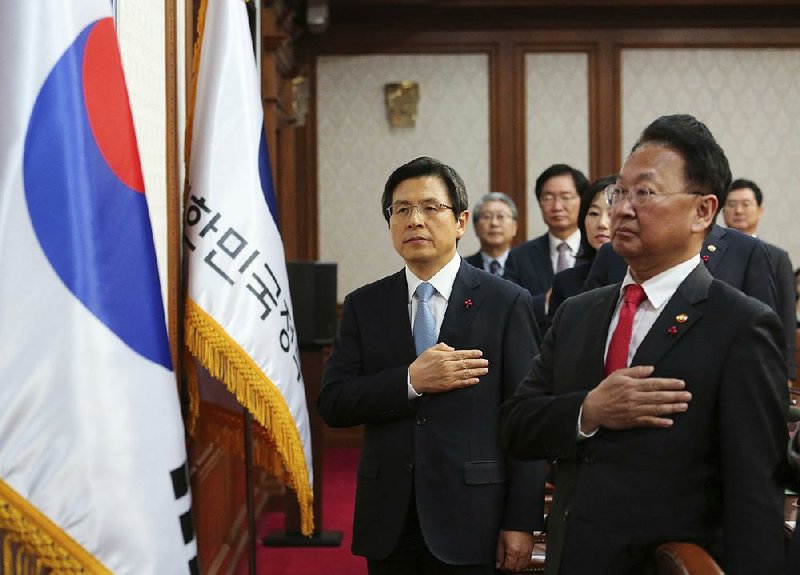SEOUL, South Korea -- South Korean lawmakers on Friday impeached President Park Geun-hye, the country's first female leader, after protests that drew millions into the streets in united fury.
After the vote, parliamentary officials hand-delivered formal documents to the presidential Blue House that stripped Park of her power and allowed the country's No. 2 official, Prime Minister Hwang Kyo-ahn, to assume leadership until the Constitutional Court rules on whether Park must permanently step down. The court has up to six months to decide.
"I'd like to say that I'm deeply sorry to the people because the nation has to experience this turmoil because of my negligence and lack of virtue at a time when our security and economy both face difficulties," Park said after the vote, before a closed meeting with her Cabinet.
Park, 64, suggested that she intended to fight her impeachment, telling Cabinet members hours later that she would "calmly" prepare for the court trial and giving no hint that she would resign.
"I am gravely accepting the voices of the people and the National Assembly, and I sincerely hope that the confusion will come to a satisfactory end," she said in remarks broadcast on national television.
Hwang separately said he wanted "the ruling and opposition political parties and the parliament to gather strength and wisdom so that we can return stability to the country and people as soon as possible."
Once called the "Queen of Elections" for her ability to pull off wins for her party, Park has been surrounded in the Blue House in recent weeks by millions of South Koreans who have taken to the streets in protest. They are furious over what prosecutors say was collusion by Park with a longtime friend to extort money from companies and to give that confidante extraordinary sway over government decisions.
Organizers said about 10,000 people gathered in front of the National Assembly to demand that lawmakers pass the impeachment motion. Some had spent the night on the streets after traveling from other cities. Scuffles broke out between angry anti-Park farmers, some of whom had driven tractors to the assembly from their farms, and police.
"Can you hear the roar of the people in front of the National Assembly?" Kim Kwan-young, an opposition lawmaker, said. "Our great people have already opened the way. Let's make it so we can stand honorably in front of history and our descendants."
When impeachment happened, many of those gathered raised their hands in the air and leapt about, cheering and laughing.
"My heart is beating so fast," said Han Joo-young, 47, who had come from Paju, north of the capital. "I am so touched that people who are usually powerless can have so much power when they come together."
Early this morning, crowds gathered again to celebrate the impeachment. Protesters were planning to march near the Seoul presidential palace.
The handover of power prompted the prime minister to order South Korea's defense minister to put the military on a state of heightened readiness to brace for any potential provocation by North Korea. No suspicious movements by the North were reported, however.
Park will be formally removed from office if at least six of the Constitutional Court's nine justices support her impeachment, and the country would then hold a presidential election within 60 days.
National Assembly speaker Chung Sye-kyun said the bill on Park's impeachment was passed by a vote of 234 for and 56 opposed, with seven invalid votes and two abstentions. That was 34 votes more than the necessary two-thirds vote needed in the 300-seat assembly, with the opposition getting strong support from members of Park's party.
Present for the vote were relatives of the victims of a 2014 ferry disaster that killed more than 300 and was blamed in part on government incompetence and corruption; they cheered and clapped after the impeachment was announced. Most lawmakers left the hall quietly.
South Korean lawmakers last voted to impeach a president in 2004, when they accused President Roh Moo-hyun of election law violations and incompetence. The Constitutional Court restored Roh's powers about two months later, ruling that his wrongdoings weren't serious enough to justify his unseating.
Park has repeatedly apologized over the public anger caused by the latest scandal, but has denied any legal wrongdoing. She attempted to avoid impeachment last month by making a conditional offer to step down if parliament could come up with a stable power-transfer plan, but the overture was dismissed by opposition lawmakers as a stalling ploy.
In indicting Park's longtime friend, Choi Soon-sil, and two former presidential aides last month, state prosecutors said they believed the president was "collusively involved" in criminal activities by the suspects. Choi and the two former aides were accused of bullying large companies into providing tens of millions of dollars and favors to foundations and businesses Choi controlled, and enabling Choi to interfere with state affairs.
Information for this article was contributed by Foster Klug, Kim Tong-hyung and Hyung-jin Kim of The Associated Press; and by Choe Sang-hun and Motoko Rich of The New York Times.
A Section on 12/10/2016
